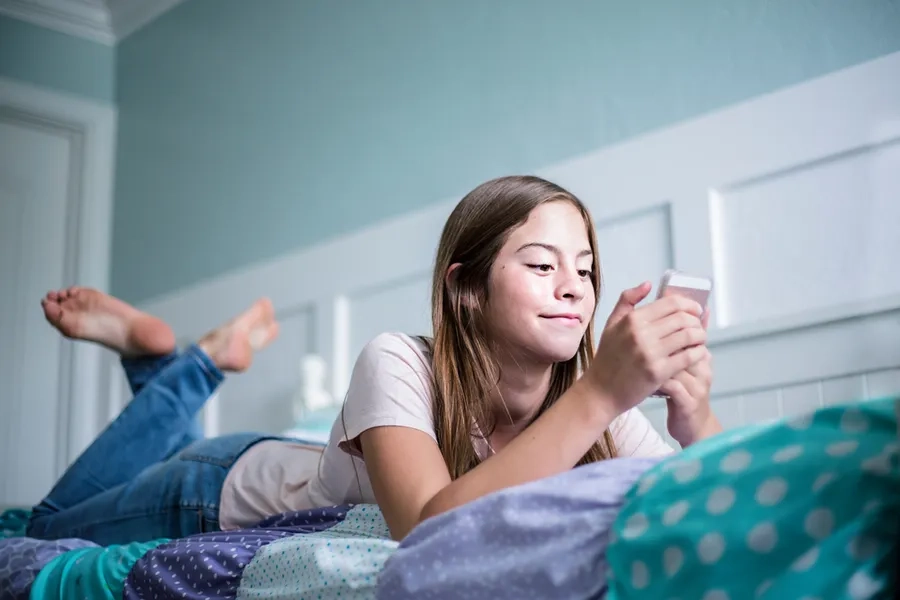ADVERTISEMENT
Understanding How Screen Time Contributes to Chronic Sleep Deprivation in Adolescents: Insights from a Pediatric Sleep Expert on the Vital Role of Sleep in Teen Mental Health

The passage discusses how excessive screen time affects sleep and mental health in adolescents, emphasizing the need for responsible screen use and prioritizing sleep for overall well-being.
ADVERTISEMENT
As a new school year kicks off, the perennial struggle to establish healthy bedtime routines for kids resurfaces. Among the challenges faced by parents, resetting boundaries on screen time, especially before bedtime, stands out as a significant hurdle.
Research increasingly highlights the intricate interplay between sleep, mental health, and screen usage among adolescents, commonly referred to as teens and tweens, roughly aged 10 to 12. Against the backdrop of a concerning mental health landscape where a considerable portion of U.S. adolescents grapple with mental health issues, inadequate sleep emerges as a compounding factor.
The correlation between sleep quality, mental well-being, and screen time is evident. As a lead physician at Seattle Children’s Hospital's sleep center, our team consistently witnesses the adverse impacts of excessive screen exposure, particularly on social media, which not only disrupt sleep but also affect the overall health—both physical and mental—of our young patients.
The Link between Mental Health and Sleep Quality
Extensive research underscores the intricate connection between mental health and sleep. Individuals grappling with depression and anxiety commonly experience insomnia, a condition characterized by difficulty falling or staying asleep, or experiencing restorative sleep. The perpetuation of sleep deprivation further exacerbates underlying depression and anxiety, establishing a cyclical pattern of worsening conditions.
Moreover, insomnia and poor sleep quality can diminish the efficacy of therapeutic interventions and medication. At its most severe, chronic sleep deprivation escalates the risk of suicidal ideation and attempts. Studies have indicated that even minor reductions in sleep duration significantly elevate feelings of hopelessness, suicidal ideation, and substance misuse among adolescents.
The Impact of Screen Time on Sleep Quality
The allure of screens and social media poses a formidable challenge to healthy sleep patterns. Engaging with social media platforms before bedtime not only prolongs wakefulness but also disrupts the body's natural sleep-inducing mechanisms, primarily through the suppression of melatonin production.
Furthermore, the content consumed on these platforms, characterized by fast-paced imagery and stimulating narratives, impedes the transition to restful sleep. The pervasive influence of social media fosters a sense of FOMO (fear of missing out), contributing to unrealistic standards and exacerbating mental health concerns, including poor body image and heightened anxiety.
Navigating Towards Solutions
Addressing these challenges necessitates a multifaceted approach. Parents and caregivers play a pivotal role in fostering healthy sleep habits and modeling responsible screen usage. Setting realistic goals and gradually implementing changes, such as reducing screen time before bedtime, can yield significant improvements over time.
Recognizing the signs of sleep deprivation and mental health disorders is crucial, prompting timely intervention and seeking professional guidance when necessary. While avoiding screens an hour before bedtime is ideal, compromises such as limiting screen time to passive activities or gradually reducing screen exposure can be effective strategies.
Ultimately, prioritizing sleep as a cornerstone of overall well-being is imperative, safeguarding against the myriad adverse effects of chronic sleep deprivation. By fostering a balanced approach to screen usage and promoting healthy sleep habits, caregivers can empower adolescents to navigate the digital landscape while prioritizing their mental and physical health.
Related Posts

Discovering Effective Hair Loss Treatments for Men

Our Sense of Taste Helps Pace Our Eating – Understanding How May Lead to New Avenues for Weight Loss

Understanding Your Blood Test Results: A Toxicologist's Guide to Interpreting Them

Fatherhood has been shown to alter the structure and function of men's brains, as indicated by MRI scans conducted before and after becoming a father.
You May Like
ADVERTISEMENT


